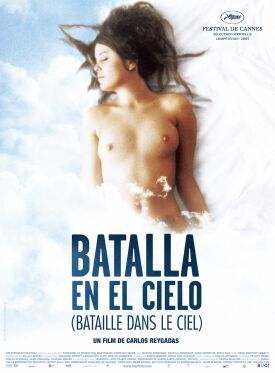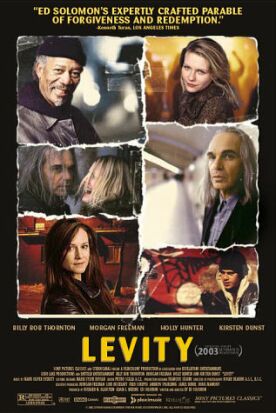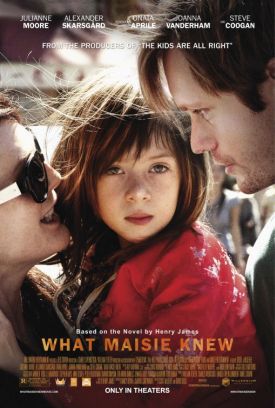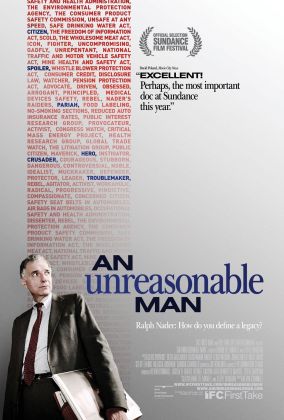Battle in Heaven
When I saw Battle in Heaven I had a temperature of 101 degrees, and, but for the unpleasantness that tends to accompany that condition, I would recommend it to others as the best way into a movie that already looks like a fever dream. The fever-hot young Mexican director, Carlos Reygadas (Japón), confesses in the press materials that “unfortunately, narrative is still a part of cinema and I don’t know how to get around that.” Maybe not, but he’s had a pretty good shot at getting around it.What he calls the “pretext to make a film, a storyline, like a spinal cord to link things together” is only hinted at in the succession of images he parades in front of us, most designed to impress and some to shock.
The “battle” part of the title is perhaps suggested by scenes of an army unit marching up and down to the sound of an annoyingly shrill bugle while a stupendously large Mexican flag is furled and unfurled in front of us. The “heaven” part will have to remain a surprise for those who — if there are any such — have nothing better to do than watch the film, but it has only the most tangential of relations to the battling part. I can also tell you that it is not an idea of heaven that will recommend itself to most Christian believers. Out of this lot of images we must do our best to try to extract some kind of spinal cord-like storyline.
Marcos (Marcos Hernández) and his wife (Bertha Ruiz) are apparently among modern-day Mexico’s small-time kidnapping entrepreneurs. Following the example of bigger and better organized criminals who kidnap rich people and ask for large ransoms, they kidnap poor people and ask for small ransoms. When even those prove to be beyond the means of the families of their victims, they are as ruthless as the big boys in killing them. Marcos and the missus have just lost a baby, they say. They speak of the loss as if it were their own, but it must be a kidnapped child. For some reason not made clear, Marcos is having pangs of conscience and says he will turn himself in to the police.
But first, Marcos, in civilian clothes, marches behind the soldiers and the giant flag. His day job is as a driver for a high-ranking general and his family. We never meet the general, but his daughter, Ana (Anapola Mushkadiz) seems to be living a life of wild sexual promiscuity that only Marcos knows about. That’s where some of the shocking imagery comes in. The baby’s kidnapping and death take place off-screen — whence this unwonted delicacy, I wonder? — but the film begins and ends with an explicit act of fellatio. The young and attractive Ana performs this Lewinskyian service on the old and immensely fat Marcos with a tear crawling down her cheek.
As Michael Winterbottom’s 9 Songs showed, you can still get a certain amount of attention for a movie just by showing real, as opposed to simulated sex. If your artistic credentials are strong enough — as Señor Reygadas’s apparently are — you can call this art rather than pornography. It also helps that Marcos is so fat and unattractive. “Movies about sex that concentrate on the outside in order to excite us are pornographic, says Carlos Reygadas, “and I am absolutely not making pornography.” Well, he’s got that right — unless you’re into the Big Butts school of erotica. For Marcos also makes love to his wife, who is even fatter than he is, and more of an anaphrodisiac of a movie sex scene I hope you may never experience.
What, you may ask, have Porky and Petunia in rut to do with that shadowy and unwanted narrative “pretext”? Something to do with kidnapping, wasn’t it? Or the secret life of the general’s daughter? Ah, there I’m afraid I cannot help you. Sometimes the narrative pretext is more of a pretext than others. Is there something about Marcos’s conscience we’re meant to understand? Or perhaps his self-esteem? Surely not about heaven or battles, which are both extremely far-fetched? I’m blowed if I know.
To put it bluntly, this is a confession of defeat. Instead of being able to tell you what Señor Reygadas means to say in his film, I am thrown back once again onto what he says in the press materials. There he “objects strongly to the notion that any explicit depiction of sex automatically knocks a movie out of the realm of fiction into documentary: ‘Why would you not say the same thing about a shot of someone eating a sandwich? Why should sex be in a different category?’” Ah, that’s the kind of faux profundity we used to hear back in the 1960s, before Señor Reygadas was born. And anyone who has not spent his life in an ideological hot-house knows the answer to that question. It is that sex is different from eating a sandwich. Maybe it shouldn’t be, but it is and always has been bound up with our socially-constructed but seemingly unavoidable sense of shame. It’s all very well pretending that this doesn’t exist for the sake of a movie, but the audience will know that it does exist. Therefore, it will also know that if you show people engaged in sex acts in the movie it’s only because of the movie.
Such tedious self-reference doesn’t bother the post modern film-maker because he assumes that his audience likes fakery. Fakery is po mo film-making’s stock in trade. But Señor Reygadas seems to aspire to something more high-brow and serious. He looks back to the surrealists as his model and has a nice line in surrealist-type patter about getting at larger truths with his hyperreal images. Anyway I’m not buying it. There are a lot of things that are larger than we are (most of us) used to in this movie, but truth is not among them.
Discover more from James Bowman
Subscribe to get the latest posts to your email.








